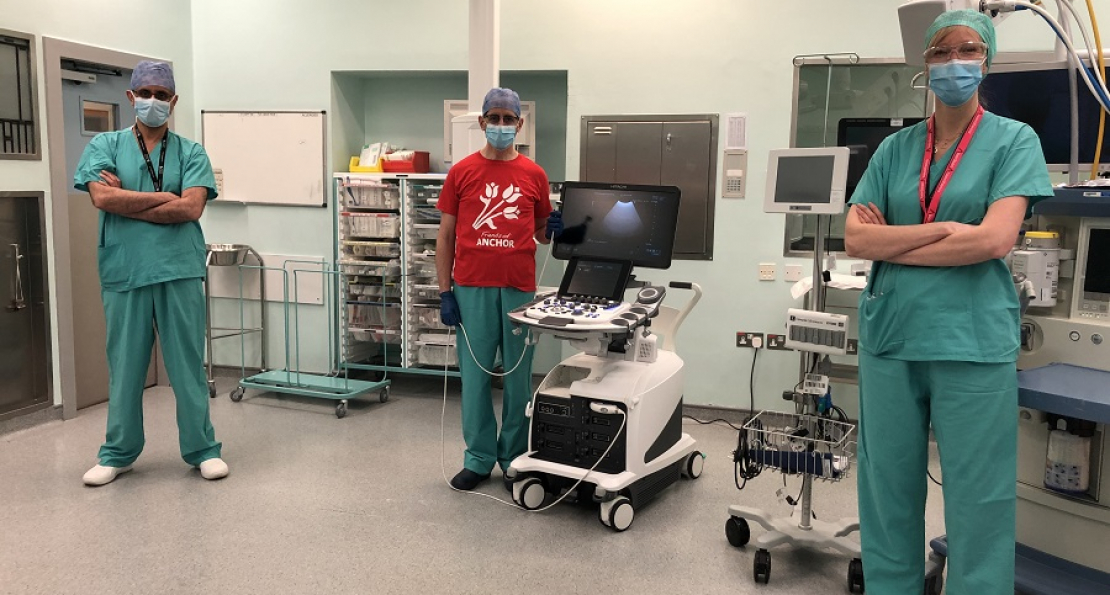New equipment funded by two North-east charities has been hailed as a ‘gamechanger’ by the surgeons using it.
Friends of ANCHOR joined forces with the NHS Grampian Endowment Fund, with support from the Scottish Government, to fund an ultrasound scanner that’s used in operations to remove cancerous lesions from the liver and pancreas.
The Hitachi Arrietta 850 is a high-tech ultrasound scanner that provides an unparalleled image of the organs and any cancerous tissue within.
The scanner is used during liver resection surgery, enabling surgeons to remove areas of disease with improved accuracy, resulting in improved long-term survival for patients with a diagnosis of liver cancer or secondary cancer which has spread to the liver. It also allows surgical teams to accurately locate small tumours in the pancreas and their relationships to major blood vessels, allowing better curative surgery.
Bassam Alkari [pictured centre with colleagues Dr Gwen Johnston (R) and Professor Irfan Ahmed (L)] is a Consultant Hepato-Pancreatico-Biliary (HPB) Surgeon at NHS Grampian. Mr Alkari specialises in operating on tumours found in the liver, pancreas and biliary tree. He applied for funding for the top-of-the-range scanner, having been trained in its use by G Torzilli, a world expert in Milan and a pioneering liver-preservation surgeon.
With a substantial price tag of £128,542, the cost of the Hitachi Arietta was funded by three groups, with Friends of ANCHOR investing £65,000. NHS Grampian Endowment Fund provided funding of £28,542 and a bid for Scottish Government funding of £35,000 was won by Mr Alkari.
The benefits brought by the investment have been considerable, said Mr Alkari, who explained that improved performance means fewer post-operative complications, better recovery and higher cure rates.
He said: “We’ve been using this new tool day in, day out, and it’s had a significant impact on our productivity. It’s particularly useful in complex cases, where the patient wouldn’t have otherwise been a suitable candidate for a liver resection. It has increased the number of patients who are deemed resectable by around 20%; in that respect it’s a game changer. There’s a whole new cohort of patients who now have the opportunity for this treatment.
“More keyhole surgeries and more liver preservation means quicker, more accurate surgery and faster recovery with less complications, so as well as the increased numbers of resections, we’re seeing quicker recovery and a reduction in hospital bed requirement, morbidity and mortality.”
The ultrasound scanner gives surgeons confirmation, while their patient is in theatre, that an adequate margin has been given for the resected cancer. An optimum margin means improved long-term survival, reduced early recurrence, and reduced need for chemotherapy.
It’s an investment that Friends of ANCHOR has been pleased to support, said charity director Sarah-Jane Hogg.
“Having this equipment available in NHS Grampian gives North-east patients the assurance that they are receiving optimal treatment, with the best possible equipment. Combined with the expertise of an experienced team of HPB surgeons, this gives patients the best possible chance of life and time with their families. It’s thanks to donors that Friends of ANCHOR could play a part in bringing this kit to Aberdeen and we’d like to say a huge thank you to them for making investments like these possible.”


